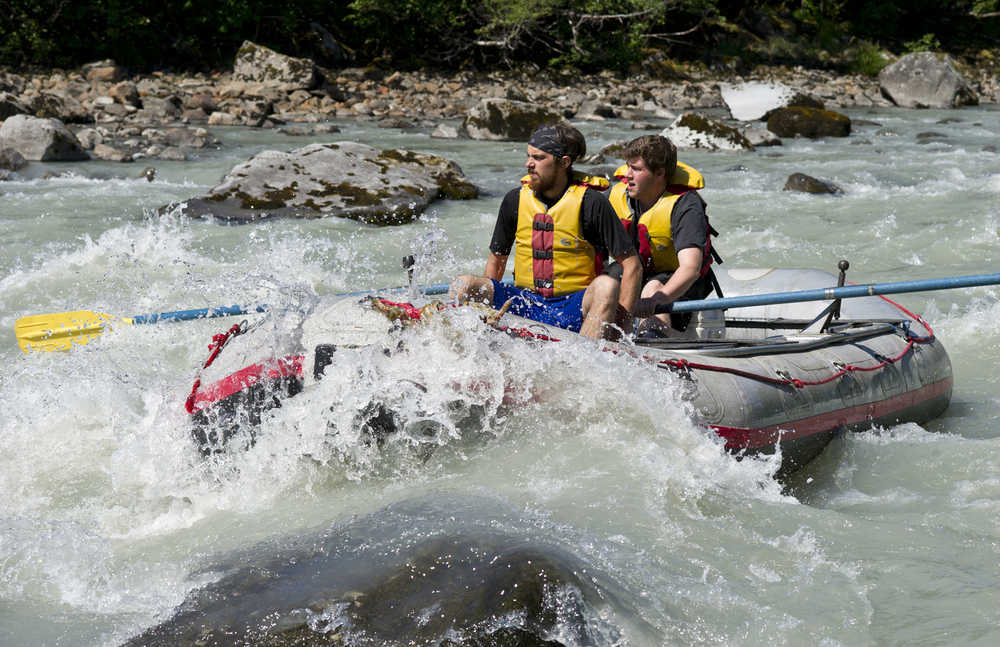Tom Stewart is in the business of weddings. Now, he’s in one of his own.
On Friday, the U.S. Forest Service announced the names of 15 companies that have won the lucrative rights to bring tourists into the Mendenhall Glacier National Recreation Area.
The smallest of those 15 was Stewart’s business, Alaska Weddings on Ice, which was given 50 permits to take bride, groom and wedding party to Nugget Falls. Alaska Weddings on Ice is effectively married to the glacier.
“It’s a unique location to do wedding ceremonies,” Stewart said.
While more parties prefer his helicopter options — getting married on top of the glacier, rather than in front of it — there’s an adventurous set that doesn’t mind walking 20-25 muddy minutes in gown and tux.
“A lot of folks want to go out there,” Stewart said. “It’s probably one of the most accessible glaciers in the country.”
That accessibility poses both problems and opportunities for the U.S. Forest Service, which manages the Mendenhall area to support about 465,000 tourists per year.
“We’re definitely at capacity,” said Brad Orr, Juneau District Ranger for the Forest Service.
In summer 2015, Juneau received 977,000 tourists. In the Forest Service’s experience, about half of Juneau’s tourists visit the glacier.
Those half-million people almost always arrive in the five months between May and September. To keep things manageable, the Forest Service doles out permitted “service days” to Juneau tour providers. A service day is one tourist visiting the Mendenhall Glacier for one day. Anyone who goes to the glacier on their own doesn’t need a permit, but each bus company or taxi service carrying a tourist needs to have one. This summer, for the first time in 19 years, the Forest Service changed the way in which it distributes service days. In an open process, it solicited requests from companies interested in some of in 239,000 service days — almost half of all allowed by the Forest Service.
For those 239,000 service days, the Forest Service got almost 640,000 requests, spread among 18 companies.
“We expected there to be a lot of interest, but I guess we weren’t expecting more than three times the (available permits),” Orr said. “That was a bit of a surprise.”
This winter, the Forest Service is starting a long-term planning process to figure out how to accommodate more people at the glacier. That might include plans for new trails, bigger bathrooms, more parking or something else entirely. The goal is to have something in place by 2020, when these new service permits expire.
With that deadline years away, the Forest Service winnowed this year’s applicants with a competitive process that took into account past performance, the quality of the application and whether the tours promised to take people onto trails and away from the overcrowded visitor center.
Gastineau Guiding, which offers guided tours away from the center, was awarded more than 40,000 service days.
In comparison, Juneau Tours and Alaska Coach Tours, which have long service records but were competing for access to the visitor center, were awarded 66,000 and 45,000 service days, respectively.
Glacier Taxi, Dolphin Tours LLC and Last Chance Tours got zero service days. Those three companies each have other permits that won’t expire until 2020, allowing them to continue operations.
“It was a competitive process, and they just didn’t compete as well as the others,” Orr said. “When you have a limited number to distribute out and it’s a competitive process, then unfortunately, some are not going to fare as well.”
Five companies were awarded service days for the first time: 12th Street Taxi & Tours; Admiralty Excursions, First Student, Liquid Alaska Tours, and World Cycling Tours.
“We’re starting a new service here in Juneau: bicycle tours and bicycle rentals,” said Roland Pope of World Cycling Tours.
His company won 3,400 service days’ worth of permits to run tours up the Powerline Trail.
“The only way to get to the Powerline Trail is by walking or biking,” he said, “so nobody bid on them.”
Each company is required to pay the Forest Service for each service day — $1.63 per person this year. Next summer, the Mendenhall Visitor Center fee will be included; it’ll go up to $6.65 per person.
“That was the easy part,” Pope said of the application process. “This’ll be hard. Hopefully, it’s not a rainy summer.”
He laughed at the idea that the permit process is a marriage with the Forest Service.
“It might be,” he said, “but they’re the boss.”

